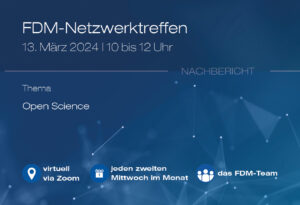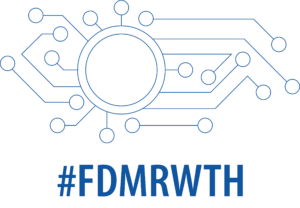
Quelle: Eigene Darstellung; Freepik
Am 13. März 2024 fand wieder das offene FDM-Netzwerktreffen der RWTH Aachen für Data Stewards, FDM-Verantwortliche und FDM-Interessierte statt. Das Thema des digitalen Treffens war „Open Science“ und wurde von Monica Gonzalez-Marquez – Open Science Managerin am Forschungszentrum Jülich – vorgestellt.
FDM-Speed-Dating zum Kennenlernen
Beim FDM-Netzwerktreffen geht es nicht nur um spannende Themen rund um das FDM, sondern auch um den persönlichen Austausch und das Teilen von Erfahrungen im Netzwerk. So gab es zu Beginn des offenen FDM-Netzwerktreffens eine Speed-Dating-Runde, in der die Frage „What is Open Science and what is it good for?“ diskutiert und später über ein Online-Umfrage-Tool im Plenum vorgestellt wurde. Was mit Open Science erreicht werden soll, war den meisten Teilnehmenden des Netzwerktreffens bereits klar, wie es aber in der Realität funktionieren und umgesetzt werden kann, konnten die Teilnehmenden des Netzwerktreffens im anschließenden Vortrag erfahren.
Vortrag zu Open Science
Und wie lässt sich „Open Science“ denn nun definieren? Open Science, so Monica Gonzalez-Marquez gleich zu Beginn Ihres Vortrags, wird laut UNESCO mit den Stichworten „Transparenz, Überprüfbarkeit, Kritikfähigkeit und Reproduzierbarkeit“ beschrieben. Nach COARA (Coalition for Advancing Research Assessment) ermöglicht Open Science durch verifizierbare und reproduzierbare Prozesse eine systematische Nachnutzung von Forschungsergebnissen, was insgesamt die Qualität und Bedeutung der Forschung verbessert. In der heutigen Praxis jedoch werden Forschungsergebnisse in Form von Artikeln, Daten, Postern oder Vorträgen offen und für Nutzende kostenlos (Open Access) bereitgestellt, ohne dass diese tatsächlich nachgenutzt werden können, weil zu viele Kontextinformationen fehlen.
Um Open Science „real“ und für die Menschen, denn Forschende sind Menschen und keine Maschinen, nutzbar zu machen, hat Gonzalez-Marquez das „Heliocentric Model of Open Science Documentation“ entwickelt, das sie in ihrem Vortrag vorstellt. Das Helio-Modell stellt statt des wissenschaftlichen Artikels den Forschungsprozess in den Mittelpunkt und adressiert alle Informationen, die zum Verständnis dieses Prozesses – also dessen Beschreibung, Diskussionen und Entscheidungen, Methoden und Ergebnisse – erforderlich sind. Es ist ein prognostisches Modell, das ein klares Bild davon vermittelt, was Open Science wirklich ist und wie wissenschaftliches Dokumentieren in der Zukunft aussehen sollte. Ziel ist es, die Qualität der wissenschaftlichen Dokumentation zu verbessern, damit Forschungsprozesse tatsächlich transparent und reproduzierbar werden.
Für alle, die noch tiefer in das Thema Open Science und Helio eintauchen möchten, gibt es eine Aufzeichnung von Monica Gonzalez-Marquez auf YouTube.
Das nächste FDM-Netzwerktreffen
Datum: 8. Mai 2024
Uhrzeit: 10 bis 12 Uhr
Ort: Konferenzraum der Universitätsbibliothek – Anmeldung
Weitere Informationen zum offenen FDM-Netzwerktreffen finden Sie auf den Seiten der Universitätsbibliothek der RWTH Aachen. (*)
Mehr erfahren
Sie sind am FDM-Netzwerk interessiert und möchten auf dem aktuellen Stand gehalten werden? Dann abonnieren Sie die Mailingliste „DataStewards@RWTH“.
Bei Fragen zum FDM-Netzwerk oder zum FDM im Allgemeinen schreiben Sie einfach eine Nachricht an das IT-ServiceDesk. Das FDM-Team freut sich auf Ihre Nachricht.
Verantwortlich für die Inhalte dieses Beitrags sind Lina-Louise Kaulbach und Ute Trautwein-Bruns.
(*) Der Absatz wurde am 05.04.2024 aktualisiert.





Schreibe einen Kommentar
Du musst angemeldet sein, um einen Kommentar abzugeben.